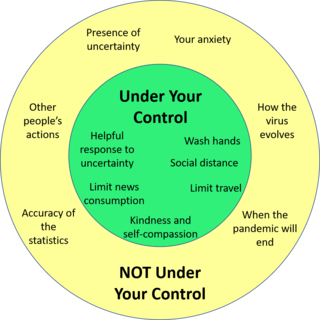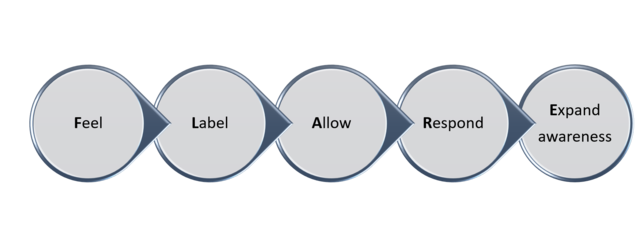Coronavirus Disease 2019
5 Steps to Living with Uncertainty During Coronavirus
A guide for responding to anxiety and lack of control.
Posted March 11, 2020 Reviewed by Gary Drevitch
In the last few weeks, with the coronavirus making its rounds around the world, there is more uncertainty as to what we’ll be doing in the next few months, weeks, or even days than many of us can remember experiencing in a very long time.
In the face of this uncertainty, do you find yourself scouring the internet for answers to all the questions running through your mind? Are you playing out all the what-if scenarios that your mind creatively supplies in large quantities in the hope that if something terrible actually happens, you’ll be better prepared? Do you find that much of your time and energy is devoted to either figuring out answers to questions that don’t have answers or trying not to think about the scary possibilities, all unsuccessfully?
If the answer to any of that is yes, rest assured, you are not alone. Uncertainty is one of the most difficult human experiences. Uncertainty means not having control over what might happen to us. We don’t do so well when we don’t have a sense of control – we may feel more anxious and more depressed and be more susceptible to pain and physical illnesses. Because a sense of control is so vital to our health and well-being, our minds go to great lengths to gain a sense of control in the face of uncertainty.
The actions that you may have found yourself engaging in recently – searching the internet for answers, playing out what-if scenarios, repeatedly worrying about what might happen in the future – are all an attempt by your mind to gain a sense of control. If you cannot have actual control, your mind attempts to make you feel as if you have control. If you think of enough what-if scenarios, and if you can find enough answers, you’ll be in control of what happens.
Of course, none of this actually gives you more control. Uncertainty is inevitable. Futile attempts to get rid of it take up a lot of your time and energy. As a result, you feel anxious and drained, and in no more control of uncertainty than before.

I am not suggesting that you should not have a plan for how to handle illnesses and other urgent situations. It is helpful to have a flexible plan for what to do to protect yourself and others. However, it is impossible to think through every scenario. Attempts to do that drain you of time, energy, and resources, and don’t leave enough to respond adaptively and resiliently to real-time changes in circumstances, usually ones you have not thought of or could have predicted.
Therefore, I suggest putting in the effort to create a flexible plan once, without repeatedly going over it. Your plan should focus on what is reasonably under your control. For example, regarding the coronavirus, it is helpful to have a plan that is consistent with CDC guidelines for how to reduce the risk of infection and what to do if you fall ill. It is helpful to decide what to do about planned vacations or large social events, or when to keep yourself away from others. On the other hand, it is not helpful to try to figure out whether and by how much the official statistics are inaccurate, who in your neighborhood may have been exposed, or whether this virus is still going to be around in six months.
Once you’ve made a plan based on what is under your control, the goal is to allow yourself to experience uncertainty, disengage from attempts to get rid of it, and allow yourself to respond to the discomfort of uncertainty in helpful ways.
Below is a step-by-step approach you can use when you experience uncertainty. The acronym for this approach is FLARE.

- Feel refers to the pre-verbal awareness of the uncomfortable feeling - noticing your experience when you find yourself searching the internet for too long, or not being able to stop going through what-if scenarios, or trying to find answers to the various questions in your mind that have no definitive answers. You might feel the tension in your chest or shoulders, the heaviness in your head, discomfort in your stomach, or shortness of breath.
- Label this experience as “uncertainty” or “unhelpful thinking” or give it some other short non-judgmental descriptive label. Typically, when you feel anxious, the fear center of the brain, the amygdala, gets activated. At the same time, the parts of your prefrontal cortex responsible for decision making and problem-solving become less active. This pattern of activation may lead you to unhelpful automatic reactions to uncertainty and anxiety. The process of labeling your experience reverses this pattern – your amygdala becomes less active, and the areas of prefrontal cortex that help you regulate emotion, make decisions, and choose helpful action become more active. This is exactly what you need – activating the parts of your brain that are most useful in responding to uncertainty or other difficult feelings.
- Allow yourself to experience uncertainty – its presence is not under your control. You will end up wasting valuable time, energy, and resources on futile efforts to get rid of it. Remind yourself that “it is ok to feel this way.”
- Respond to the discomfort of uncertainty in a way that allows you to disengage from the unhelpful thinking without trying to ignore it. The following are some helpful ways to respond.
- Respond to the what-ifs and other questions rolling around in your mind with “I don’t know.” Because that is the truth – you don’t know the answers to these questions and you don’t know what will happen in these what-if scenarios. Responding with “I don’t know” allows you to disengage from the effort to produce an answer as well as from unproductive attempts to ignore your thoughts (you have probably noticed that trying to not think about something only makes those thoughts more frequent and persistent).
- Take some low and slow breaths. Please see my previous post on how to do that. Low and slow breathing will allow the intensity of the discomfort you are experiencing to ease, while providing your brain with the oxygen it needs.
- Bring some kindness and compassion into the difficult moment. Times of uncertainty are difficult for all humans. There is nothing you can do to eliminate the uncertainty. Kindness and compassion will help ease the discomfort of uncertainty. One of my favorite ways to be kinder to yourself at a time of uncertainty is modeled on Kristin Neff’s self-compassion break. Allow yourself to roll these words around in your mind, while taking some easy low and slow breaths:
This is a moment of uncertainty.
Uncertainty is difficult to bear.
All people feel this way sometimes.
May I be kind to myself.
May I find peace and contentment.
5. Expand your awareness by taking the sharp focus off the discomfort of uncertainty and taking in the sights and sounds around you – the sky above your head, the floor under your feet, the chair you are sitting in, the person you see in front of you. Then shift your attention to the internal sensations — your breath, your heartbeat, and your itchy nose. This step allows you to see the uncertainty as a part of your experience, not all of it, thereby further reducing the intensity of discomfort.


